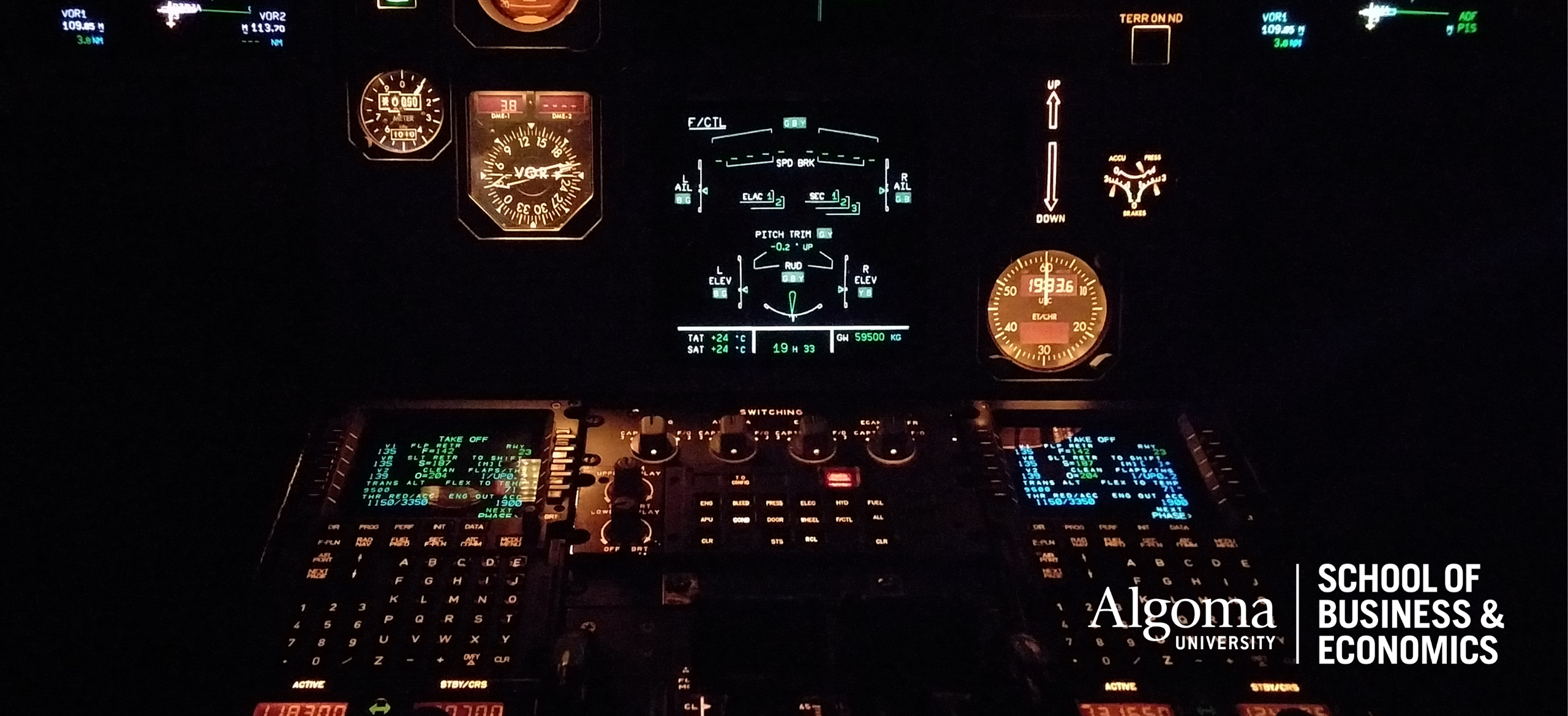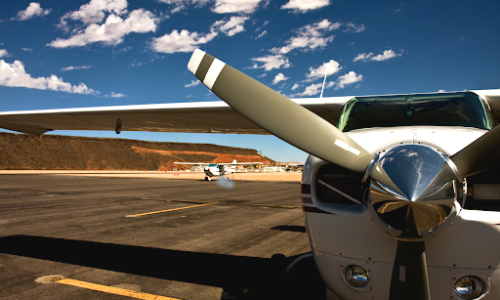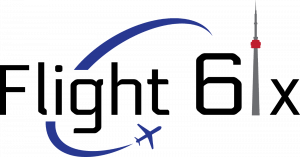

Aviation Management Specialization
- AVIA 2206 Aviation Safety Management Systems (SMS)
- AVIA 2706 Aviation Quality Assurance (AQA)
- AVIA 2806 Fundamentals of Aviation Law and Regulations
- AVIA 3306 Airline Management
- AVIA 3506 Procurement and Supply Chain Management
- AVIA 3706 Air Traffic Control and Dispatch Operations
- AVIA 3806 Airline Finance and Economics
- AVIA 4206 Corporate Aviation Management
- AVIA 4406 Crew Resource Management
- AVIA 4506 Commercial Drone Operations
External Certification Opportunities To Meet In-demand Skills
The Aviation Management Specialization is designed so that when students successfully complete the specialization they will have the option (they would have the opportunity to write the applicable exams from the accrediting bodies) to graduate with the following certifications:
- Aviation Safety Management – Certification obtained from the International Air Transport Association (IATA)
- Aviation Quality Assurance (AQA) – AQA Certification obtained from the International Air Transport Association (IATA)
- Commercial Drone Operations – Drone Certification obtained from the International Air Transport Association (IATA)
- Air Traffic Control and Dispatch Operations – Dispatcher Certification obtained from a Transport Canada recognized provider
- Crew Resource Management – CRM Certification obtained from a Transport Canada recognized provider
The culture of a commercial aviation employer requires certification to satisfy government and international requirements. Having these certifications and courses enhances employability for our graduates.
AMP Program | Flight Training Option
Interested in being a Pilot?
Students in the AMP Program will have the option to take flight training, with our partner Flight 6ix operating as Guelph Flight Centre.

All flight training in the AMP Program will be provided by Flight 6ix, operating as Guelph Flight Centre, a certified flight training establishment, registered as a Career College located in Ontario, authorized to provide training towards a career as a professional pilot.
Students in the flight training option will be provided with transportation from the SchoolBE campus to the flight training centre.
Flight 6ix Highlights:
- Conducting flight training out of the Guelph Airpark
- Average instructor flight time is 5000 hrs versus the industry average of 700hrs
- Network with our staff that have had experience working for Air Canada, Sunwing, Westjet, Jazz, Emirates, Saudia, Qatar Airways and Air India
Email Flight 6ix for more information on flight training.

Why choose the AMP Program?
AMP students can complete more than one specialization while taking the BBA! The AMP program allows students to specialize in Aviation Management, Accounting, Human Resources, Marketing and Economics with opportunities to get professional designations such as the Chartered Professional Accountants (CPA) and Certified Human Resources Professional (CHRP) as well as an Integrated Commercial Pilots License (ICPL). Students must get academic advising to chart an academic progression plan that fits their dreams and goals! The aviation industry is soaring with a growing demand and there are many career opportunities available for both the flight option and the non-flight option!
Career Opportunities
Pilots: There is a current and future demand for pilots in Canada and around the world. With more and more pilots retiring, industry growth and barriers to recruiting new workers, the aviation industry is projected to face a pilot shortage after COVID 19.
Projections indicate that Canada will face a pilot shortage in the near future:
- It is estimated that by 2025, Canada will need 15,000 new pilots
- The pilot shortage across Canada is causing some regional carriers to cancel flights
- Canada faces a shortage of 3,000 pilots and 55,000 workers overall in the aviation industry by 2025
- To meet the demand of the growing air travel industry, Canada should be producing an extra 300 pilots a year
Don’t want to be a pilot? No Problem! The aviation industry provides multiple other career options! Since Aviation is an international discipline, students equipped with these courses can work directly in the following fields:
- Passenger Airlines
- Corporate Airlines
- Cargo Airlines
- Safety Management Specialist (required for every airline)
- Quality assurance Specialist (required for every airline)
- Drone Operator (future of drone delivery, drone pilots and automated drone industry)
- Crew Resource Management(course required for every airline in the world)
- Logistics and Supply Chain
Having the specialization will enable students to progress into management jobs in their chosen discipline.
SchoolBE: [email protected]
Flight 6ix: [email protected]
FAQs
This program provides both Canadian and International students a curriculum which provides the skills and abilities they need to enter the job market. Having a specialization as such equips students with specialized courses which enable them to directly use their skills for their future employers. Each course is specifically designed to allow students to become knowledgeable on most demand careers in aviation.
Students graduate with the opportunity to receive five of the industries most recognized certifications, along with ten aviation management courses.
The AMP program will allow you to receive an undergraduate degree with a specialization in Aviation Management as well as a Commercial Pilot License!
Within four years, flight option students can obtain all licensing requirements to succeed as influential leaders in the aviation industry. Transport Canada certification number #12795 (Flight 6ix).
There are three intakes into the AMP Program
22SP – May 2, 2022
The degree program will require students to complete eight (8) academic terms of full-time study (4 years) with students completing the following milestones as their undergraduate program progresses:
Year 1: Private Pilot License and Night Rating
Year 2: Commercial Pilot License and Time Building
Year 3: Multi-Engine Rating and Instrument Flight Rules Rating
Year 4: Samra & Saron Preparations, Time Building and Instructor Rating (optional)
Courses are outlined in the Academic Calendar
The program progression is as follows:
Year 1
- ADMN 1016 Introduction to Canadian Business
- ADMN 1126 Introductory Financial Accounting I
- ADMN 1206 Management Skills and Secondary Research Methods
- ADMN 1207 Quantitative Management Decision-Making
- ADMN 1306 Commercial Law
- ECON 1006 Introduction to Microeconomics
- ECON 1007 Introduction to Macroeconomics
- AVIA 2206 Aviation Safety Management Systems (SMS) – SMS Certification
- AVIA 2706 Aviation Quality Assurance (AQA) – AQA Certification
- AVIA 2806 Fundamentals of Aviation Law and Regulations
Year 2
- ADMN 2017 Managing the Not-for- Profit Organization
- ADMN 2406 Social and Ethical Issues in Business
- ADMN 2506 Business Statistics
- ADMN 2607 Introduction to Management Science
- ADMN 3126 Marketing Concepts
- ADMN 3127 Services Marketing
- AVIA 3306 Airline Management
- AVIA 3506 Procurement and Supply Chain Management
- AVIA 3706 Air Traffic Control and Dispatch Operations – Dispatcher Certification
- AVIA 3806 Airline Finance and Economics
Year 3
- ADMN 3106 Management Accounting & Control I
- ADMN 3107 Management Accounting & Control II
- ADMN 3116 Finance I
- ADMN 3117 Finance II
- ADMN 3136 Organizational Behaviour
- ADMN 3137 Management of Human Resources
- AVIA 4206 Corporate Aviation Management
- AVIA 4406 Crew Resource Management – CRM certification
6 elective credits
Year 4
- ADMN 4046 Operations Management
- ADMN 4076 International Business OR ECON 3296 Managerial Economics
- ADMN 4606 Business Strategy and Policy I
- ADMN 4607 Business Strategy and Policy II
- ADMN 4876 Management
- AVIA 4506 Commercial Drone Operations – Drone certification
12 elective credits
The Fall term 2021 will be a transitional term: we are planning to conduct classes, labs and tutorials in person, on campus, to the fullest extent possible. For maximum flexibility, this approach will include a variety of options, including in-person, blended, hybrid, technology-assisted, and distance-education instruction, with as much as possible being delivered in-person.
* Definitions:
In-person instruction: means a class that meets in a classroom at the scheduled time/day, with the instructor and all students present (synchronous).
Blended instruction: means a class for which the instructor is present in the classroom at the scheduled time/day (synchronous), with ± 50% of the students present, and ± 50% of the students doing self-directed learning, including but not limited to activities such as sustained reading, completing assignments, watching recorded lectures on their own schedule (asynchronous). The student groups flip each week.
Hybrid instruction (also called “HyFlex”): means a class for which the instructor is present in the classroom at the scheduled time/day, with students present who wish to attend in person, and students who prefer not to attend in person participating remotely at the same time (synchronous). The student makes the choice for any given class and can switch as needed. Requires additional support for content preparation, technology and class management.
Technology-assisted instruction (TAI): means a class for which the instructor gives the class via meeting technology (e.g., Zoom, Google Meet) at the scheduled time/day (synchronous), with students attending and participating remotely. Delivered on the Moodle platform.
Distance education: means a class for which the course materials–lectures, videos, assignments, assessments, discussion boards, etc.–are prepared prior to course delivery, and which students take on their own schedule (asynchronous). Delivered on the Brightspace platform.
Prospective domestic and international students interested in the Aviation Management Professional Program (AMP) can apply directly to Algoma University!
APPLY NOW to the BBA-Aviation Management Specialization for May 2022!
Application fees are waived for this program only! Have your documents, and transcripts ready when you apply.
| Aviation Management Professional Program (AMP) l Annual Tuition and Fees* l Starting: May 2, 2022
*Tuition and fees shown are estimated. The AU Board of Governors reserves the right to amend fees after the publication of the Academic Calendar and without further notice. |
|
| International Students: $20,997.00 CAD annually* | Domestic Students: $6,780.64 CAD annually* |
For more information on the Flight Training tuition please contact:
[email protected]
Admission requirements are unique to various countries and International Curriculums. Here are the requirements based on secondary school credentials for:
- China – Senior Secondary Graduation Diploma
- Egypt – General Secondary Education Certificate (successful completion of 12 years of secondary school required). Successful completion of a first year of university studies is required if GSEC indicates 11 years completed)
- Guyana – Caribbean Advanced Proficiency Examination (CAPE) – West African Senior School Certificate (WAEC) (minimum 5 academic subjects required)
- India – Higher Secondary School Certificate (CBSE/ISC/State Board)
- Iraq – Sixth Form Baccalaureate
- Jordan – General Secondary Education/Leaving Certificate examination results
- Pakistan – Higher Secondary School Certificate
- Sri Lanka – Sri Lankan GCE A levels (2 academic subjects required)
- Trinidad – Caribbean Advanced Proficiency Examination (CAPE)
- A grade of 70% (B grade) or equivalent is required from all curriculums in order to meet the admission grade requirement for the program
- A graduation certificate along with a transcript showing courses completed and grades achieved is required in order to determine eligibility for the program
Students can also apply after finishing post- secondary schooling!
Admission requirements are as follows:
- Students applying as transfer students must have achieved a minimum overall average of 70% from post-secondary studies from an accredited diploma/degree granting institution
- Transcripts from both secondary school and post-secondary institutions attended are required in order to determine eligibility for the program
- The transcripts must indicate courses completed, grades achieved, graduation certificate from secondary school and a graduation certificate from post-secondary school if awarded
English language requirement:
The IELTS requirement for the AMP program will be an overall score of 6.0 [including 6.0 in each band of reading, writing, listening and speaking]. Proof of English language proficiency is required from all countries where English is not the first language. English Language Requirements must be met for admission into Algoma University.
Ontario Student Requirements:
- Minimum average of 70% required
- Six Grade 12 U and/or M courses including:
- English (ENG4U) (minimum final grade of 60% is required)
- Grade 12 Advanced functions (MHF4U) or Calculus and Vectors (MCV4U) course (minimum final grade of 60% is required)
Students applying as transfer students must have achieved a minimum overall average of 70% from post-secondary studies from an accredited diploma/degree granting institution
- Transcripts from both secondary school and post-secondary institutions attended are required in order to determine eligibility for the program
- The transcripts must indicate courses completed, grades achieved, graduation certificate from secondary school and a graduation certificate from post-secondary school if awarded
From another University: This is done on a case by case basis. Please contact the AMP I Admissions Advisor: Shelley Mitchell [email protected]
From an Ontario College – Pathway Agreements are in place with every College in Ontario. Please click on this link for more information Transfers and Pathways
From any other institution, please contact the AMP I Admissions Advisor: Shelley Mitchell [email protected]
We offer numerous awards based on academic achievement and financial need to both newly admitted and continuing students. You may be automatically considered for some awards strictly based on your grades, however you may choose to apply for other scholarships and bursaries. AU webpage
For more information on scholarships and bursaries, please contact [email protected]
To graduate with a Bachelor of Business Administration Degree with an Aviation Management Specialization, a student must:
- satisfy all the stated requirements for the degree
- complete 120 credits in no more than 162 credit attempts with a minimum overall average of 60% on all passed courses (only courses taken at Algoma University are to be included in the calculation of averages)
- complete all core courses (72 credits) with a minimum grade in each core course of 60%.
A student failing to attain this minimum grade in any of the core courses must repeat such courses as soon as possible.
Failure to do so will result in suspension from the program. A student is permitted to repeat a core course only once, except with the special permission of the Senate Committee on Academic Regulations and Petitions.
No problem- you can do the Aviation Management Certificate (AMC)! The AMC allows professionals with college level education to upgrade their skills to the university level without a commitment of 3-4 years. For those direct from High School, the Aviation Management Certificate also presents an excellent opportunity to learn and develop industry specific skills.
The Aviation Management Professional (AMP) program is designed to meet the growing demand in the aviation industry for both flight and non flight students. AMP graduates will receive a Bachelor of Business Administration Degree with an Aviation Management Specialization and have the option to choose flight training.
The AMP is a four year BBA degree program with a 10 course Aviation Management Specialization, provides pilots (current and future) and those interested in working in the non-flight component of the aviation industry, an opportunity to acquire the skills and abilities they need to enter the job market.
The one year 10 course Aviation Management Certificate (AMC) will provide an aviation professional looking to upgrade their skills and abilities to management level allowing for more opportunities for professional development within their current and/or future organization. Upon successful completion of courses from the Aviation Management Certificate, students can transfer into the BBA – Aviation Management Specialization Degree program without the need to repeat courses.
Please visit the following page: SchoolBE FAQ
Please visit the following section of the website: Tuition, Fees, Payment Info and Important Dates & Deadlines
Please visit the following pages:
Please visit the following page: Orientation FAQs – Algoma
